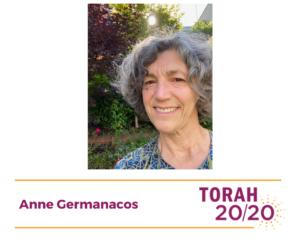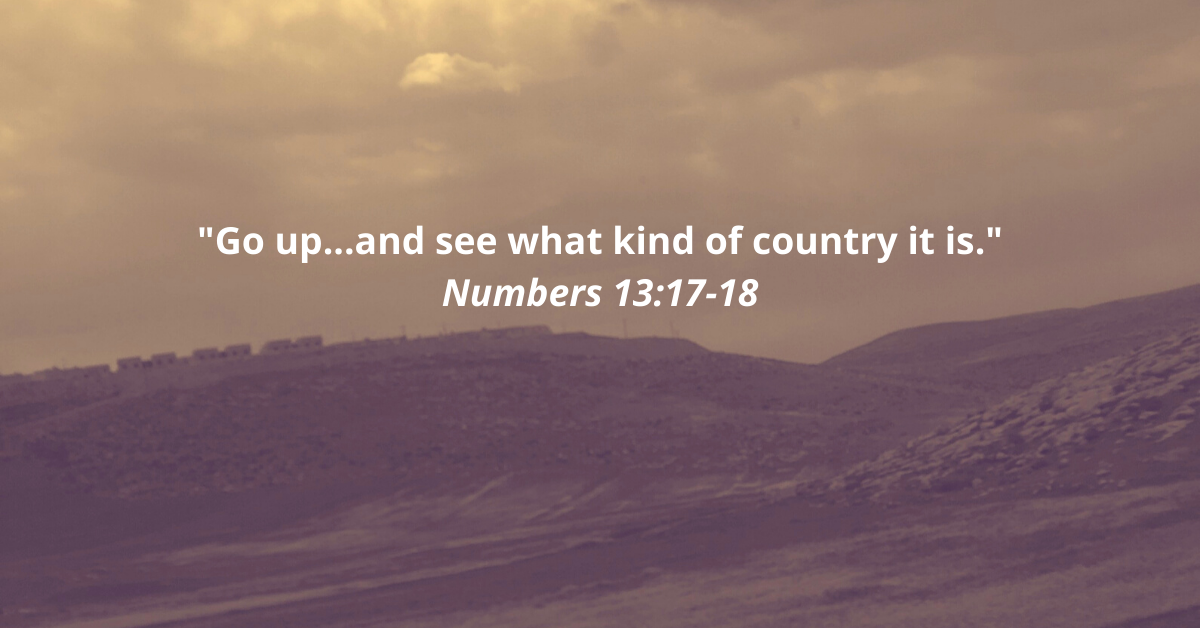A d’var Torah for Sh’lach-Lecha by Anne Germanacos.
Several years ago, Rabbi Noa Kushner challenged me to devise a method for bringing The Kitchen, our community in San Francisco, to a continually renewed sense of revelation. The challenge resulted in a liberally interpreted construction of Talmud.
Each week, I build a page containing lines from the week’s Torah portion, interspersing among them lines from contemporary Jewish and secular texts. Between each of the lines, ancient and modern, I leave space for the participant to write their own response.
In the context of a class, a service, or a Zoom call, the participant is urged to respond to one, several or all the lines offered on the page. Associative, thoughtful, emotional. A single word. A phrase. In any language. I usually allow 15-20 minutes. The process allows each participant to become actively, viscerally engaged in the age-old process of connection to text and interpretation.
Sign up to receive Torah 20/20 in your inbox each week.
I then read aloud a quoted line. Anyone who has responded reads a word, phrase or sentence from what they’ve written. As we go through the page, reading in response, together we weave what feels like a sacred space, as well as a communal prayer. It’s worked with rabbis and scholars, newcomers to Torah, as well as those of other faiths or none at all.
In this week’s parshah, the “spies” are sent forth from the wilderness to take a first look at the promised land. All but Caleb and Joshua return frightened of what they’ve seen, unable to gather the strength from God’s words to imagine themselves equipped to enter and live on the land. As we learn, there’s no revelation in spying, no redemption, either. It’s the risk taken, engendered by faith, that allows the human being to walk toward the possibility of freedom.
At a moment in time and history when we’re drowning in a destructive, degraded vision of humanity that’s impossible to unsee, grappling intimately with text in a way that’s been a vital part of our tradition from the rabbinic era may resuscitate and renew our sense of agency as Americans, as Jews, as human beings.
My Torah for this week urges each of us to walk into the unknown. Let our written lines, mixed in with the words of others – ancient and contemporary – make a path, embodied.
Find more commentaries on Parshat Sh’lach-Lecha.
“Go up… and see what kind of country it is.” Numbers 13:17-18
“Sight isolates, whereas sound incorporates… the eye reaches, but the ear receives.”
Juhani Pallasmaa, The Eyes of the Skin: Architecture and the Senses
“The real measure of the qualities of a city is whether one can imagine falling in love with it.”
Pallasmaa
“…and we looked like grasshoppers to ourselves, and so we must have looked to them.” Numbers 13:33
“…the feeling of compassion by which we recognize the neighbor precedes the concept of the self.” Mara H Benjamin, The Obligated Self: Maternal Subjectivity and Jewish Thought
“…friendship is an act of the imagination rather than of counting social media followers.”
Akiko Busch, How to Disappear: Notes on Invisibility in a Time of Transparency
“… if only we might die in this wilderness!” Numbers 14:2
“His eyes were open but his heart was shut.
At the edge of every wonder he said But…” Christian Wiman, Survival is a Style
“In the absence of a positive future perspective, one’s personal situation is experienced as imprisonment in the now of slowly passing time.” Marc Wittmann, Altered States of Consciousness
…Caleb, because he was imbued with a different spirit…” Numbers 14:24
“When something goes from being an idea to a reality, you can’t easily force your perception back into the narrow container it came from.” Jenny Odell, How to Do Nothing: Resisting the Attention Economy
“The idea that accounts of the past shouldn’t change is a product of literate cultures’ reverence for the written word.” Ted Chiang, Exhalation
“You and the stranger shall be alike before the LORD” Numbers 15:15
“And that is the sweetness and the gladness of the earthquake and the fire… joy in the other fellow.” Pauline Jacobson, San Francisco Bulletin 1906
“If we were equal, why did we live separately?” DiAngelo, White Fragility
“When you enter the land… and you eat of the bread of the land, you shall set some aside as a gift…” Numbers 15:18-19
“The world is large and wide and has no measure. And all is revealed.” Yoel Hoffmann, Moods
“All artistic and spiritual experience – perhaps everything truly important – can only be implicit; language, in making things explicit, reduces everything to the same worn coinage.” Iain McGilchrist, Ways of Attending
“Attention to silence is itself an interrogation.” Cathy Park Hong, Minor Feelings: An Asian-American Reckoning
“There’s a joke that Marcel Marceau released an album. The record consists of twenty minutes of silence followed by applause.” Shawn Wen, A Twenty Minute Silence Followed by Applause
“Marceau died on Yom Kippur.” Shawn Wen
I encourage each of you to cut and paste these pages or print them out. Sit quietly, see what happens. As an exercise with congregants, students, family, friends, it can weave a Zoom room sacred. And, if you’re game, please send your page to me (anne.germanacos@gmail.com). I will weave something for all of us, and send a link upon its completion.
Anne Germanacos is an artist and educator living in San Francisco. She contributes time and other resources to a wide variety of individuals and organizations through the Germanacos Foundation and Firehouse Fund: Cultivating Sparks. She has no illusions about changing the world but believes deeply in the possibility created by the release of frequent, small bursts of radical potential.

